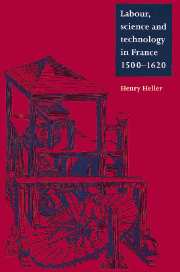Book contents
- Frontmatter
- Contents
- List of illustrations
- Preface
- List of abbreviations
- Introduction
- 1 The expansion of Parisian merchant capital
- 2 Labour in Paris in the sixteenth century
- 3 Civil war and economic experiments
- 4 Inventions and science in the reign of Charles IX
- 5 Expropriation, technology and wage labour
- 6 The Bourbon economic restoration
- 7 Braudel, Le Roy Ladurie and the inertia of history
- Bibliography
- Index
- CAMBRIDGE STUDIES IN EARLY MODERN HISTORY
2 - Labour in Paris in the sixteenth century
Published online by Cambridge University Press: 01 October 2009
- Frontmatter
- Contents
- List of illustrations
- Preface
- List of abbreviations
- Introduction
- 1 The expansion of Parisian merchant capital
- 2 Labour in Paris in the sixteenth century
- 3 Civil war and economic experiments
- 4 Inventions and science in the reign of Charles IX
- 5 Expropriation, technology and wage labour
- 6 The Bourbon economic restoration
- 7 Braudel, Le Roy Ladurie and the inertia of history
- Bibliography
- Index
- CAMBRIDGE STUDIES IN EARLY MODERN HISTORY
Summary
I am a jack-of-all-trades
Who only wants a job.
If anyone has need of me
Behold! I am ready to work.
Christophe de Bordeaux, Valet à louer à tout faireTo what extent can we speak of the French economy of the sixteenth century as capitalist? If we confine ourselves to looking at the heights of the economy, namely, banking and international commerce, the answer is an unqualified affirmative. Quite clearly, the circulation of credit and commodities at the highest level was more and more under the control of bankers and merchants from Paris and Lyons. The issuing of rentes on the Hôtel de Ville of Paris and the creation of that vast financial syndicate known as the Grand Parti of Lyons bespeak an ability to organize credit operations on a grand scale. Paris and Lyons were centres of international commerce on the level of Antwerp, Florence and Venice in the first half of the sixteenth century. Moreover, French banking and commercial activities were increasingly linked with those of the rest of Europe. On the other hand, it is not enough to confine our perspective simply to that of the circulation of large amounts of money, credit and commodities when speaking of capitalism. However much a necessary condition, the development of the European market into a world market in the first part of the sixteenth century is not a sufficient condition for us to speak of France as a capitalist economy.
- Type
- Chapter
- Information
- Labour, Science and Technology in France, 1500–1620 , pp. 28 - 56Publisher: Cambridge University PressPrint publication year: 1995

